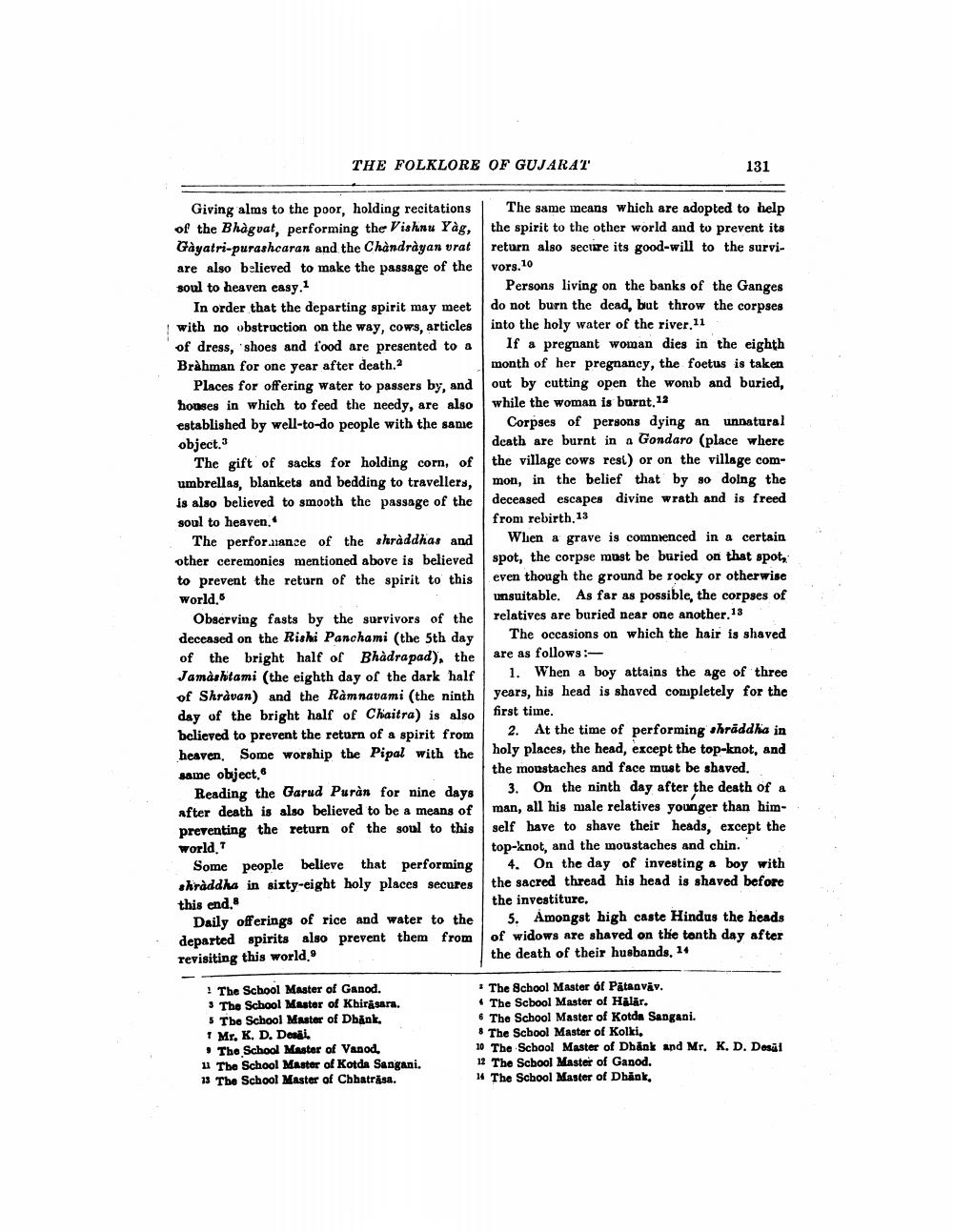________________
THE FOLKLORE OF GUJARAT
131
Giving alms to the poor, holding recitations of the Bhàgvat, performing the Vishnu Yåg, Gayatri-purashcaran and the Chandrayan urat are also believed to make the passage of the soul to heaven easy.1
In order that the departing spirit may meet with no obstruction on the way, cows, articles of dress, shoes and food are presented to a Brahman for one year after death."
Places for offering water to passers by, and houses in which to feed the needy, are also established by well-to-do people with the same object. 3
The gift of sacks for holding corn, of umbrellas, blankets and bedding to travellers, is also believed to smooth the passage of the soul to heaven.
The performance of the shraddhas and other ceremonies mentioned above is believed to prevent the return of the spirit to this world.
Observing fasts by the survivors of the deceased on the Rishi Panchami (the 5th day of the bright half of Bhadrapad), the Jamashtami (the eighth day of the dark half of Shravan) and the Rám navami (the ninth day of the bright half of Chaitra) is also believed to prevent the return of a spirit from heaven. Some worship the Pipal with the same object.6
Reading the Garud Puran for nine days after death is also believed to be a means of preventing the return of the soul to this world.
Some people believe that performing shraddha in sixty-eight holy places secures this end,
Daily offerings of rice and water to the departed spirits also prevent them from revisiting this world."
The same means which are adopted to help the spirit to the other world and to prevent its return also secure its good-will to the survivors.10
Persons living on the banks of the Ganges do not burn the dead, but throw the corpses into the holy water of the river. 11
If a pregnant woman dies in the eighth month of her pregnancy, the foetus is taken out by cutting open the womb and buried, while the woman is burnt.12
Corpses of persons dying an unnatural death are burnt in a Gondaro (place where the village cows rest) or on the village common, in the belief that by so doing the deceased escapes divine wrath and is freed from rebirth. 13
When a grave is commenced in a certain spot, the corpse must be buried on that spot, even though the ground be rocky or otherwise unsuitable. As far as possible, the corpses of relatives are buried near one another. 13
The occasions on which the hair is shaved are as follows:
1. When a boy attains the age of three years, his head is shaved completely for the first time.
2. At the time of performing Shraddha in holy places, the head, except the top-knot, and the moustaches and face must be shaved,
3. On the ninth day after the death of a man, all his male relatives younger than himself have to shave their heads, except the top-knot, and the moustaches and chin.
4. On the day of investing a boy with the sacred thread his head is shaved before the investiture,
5. Amongst high caste Hindus the heads of widows are shaved on the tenth day after the death of their husbands. 14
1 The School Master of Ganod. * The School Master of Khirgsara. 5 The School Master of Dhank, 1 Mr. K. D. Desai. • The School Master of Vanod. 11 The School Master of Kotda Sangani. 13 The School Master of Chhatrasa.
• The School Master of Pätanväv.
The Scbool Master of Hälar. 6 The School Master of Kotda Sangani. * The School Master of Kolki, 10 The School Master of Dhånk and Mr. K. D. Dosal 12 The Scbool Master of Ganod. 14 The School Master of Dhank,




